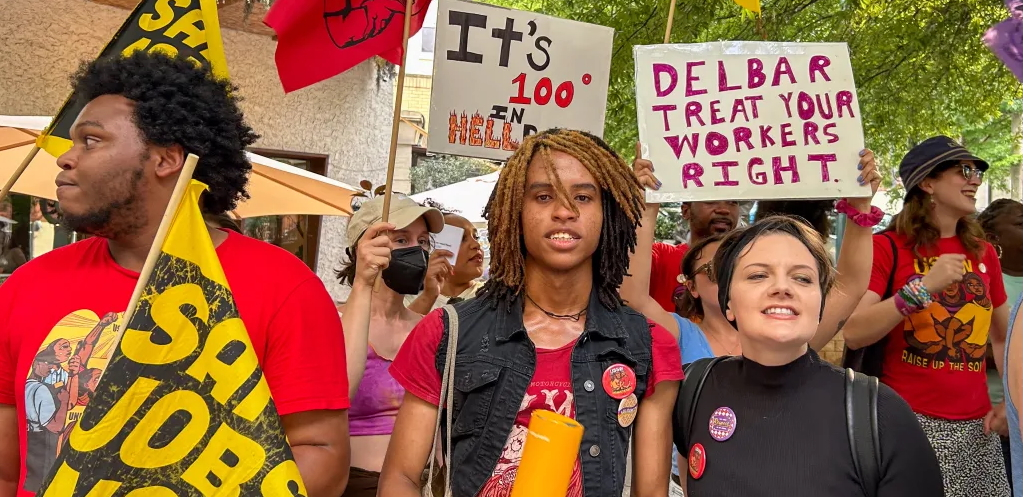Coping with Climate Crises on the Job

Cooks and servers with the Union of Southern Service Workers walked off their job at an Atlanta restaurant in July 2024, demanding $25 an hour and air conditioning. Photo: USSW
Heat, smoke, flooding, hurricanes, fires, turbulence—on the job, workers are already facing the ravages of a changing climate.
These problems are ripe for organizing—usually everyone is feeling it. Often it’s very clear what solution would help, and who could deliver it.
Such fights don’t address the underlying causes of climate change. But they’re opportunities to build union power by strengthening the bonds among co-workers and getting folks into action together.
And they can open the door to talking about how confronting climate change at its root is a union issue, too.
HEAT
Heat is getting worse. Workers outdoors, like farmworkers and letter carriers, are feeling it every summer. But so are those indoors, in warehouses, kitchens, factories, classrooms—anyplace without air conditioning.
Your work space may be a lot hotter than what the weather app says. Electricians working up near the rafters of a Boeing hangar brought their own thermometer to prove this point. Starbucks baristas did the same thing.
Workers in a sandwich shop invited an industrial hygienist to set up a table out front to interview people about the dangerous heat inside.
Amazon warehouse workers marched on their boss to demand safety breaks after one too many co-workers left in an ambulance.
Some demands that workers have made to deal with the effects of heat: Air conditioning. Fans. An ice machine. Cold drinking water. Additional breaks. The right to slow down. Shorter hours. A lighter workload. Extra pay. The right to go home, with pay, when the temperature crosses a line.
Some tactics they’ve used: Impromptu walkouts. Leafleting co-workers and customers. “Heat 101” workshops. Marches on the boss. Rallies. Taking over workplace meetings. Everyone stopping until someone who needs a break gets one. Calling 911 when a co-worker is overcome by the heat, over management’s objections. Calling OSHA. Overtime boycotts. Bargaining. Strikes.

SUPPORT LABOR NOTES
BECOME A MONTHLY DONOR
Give $10 a month or more and get our "Fight the Boss, Build the Union" T-shirt.
Workers in Washington, Oregon, California, Nevada, Colorado, and Minnesota have won state legislation establishing heat safety standards. But it still takes organizing to enforce them.
SMOKE
As wildfires grow larger and more common, workers on the West Coast have come to dread the smoky “fire season” each summer (and even winter isn’t safe, as Southern California learned in 2025). A mask can help—but if you’re working outdoors all day, what you want is the right to go home.
On a Microsoft construction site, one day as the smoke intensified, the contractor told workers they could share three masks among 10 people, or use a sick day if they had a problem with that. Everyone wanted to leave, but nobody wanted to be the first to go. They all walked off together—and got full pay, after all.
2023 marked the first summer when the Midwest and East Coast got smoked out too. UPS Teamsters in New York did what their employer should have done: they tracked down boxes of N95 respirator masks and handed them out to co-workers.
Mutual aid like that, on a larger scale, has been a feature of worker organizing when climate disaster strikes. After catastrophic flooding from Hurricane Helene, for instance, restaurant workers and union members in North Carolina organized to cook meals for displaced people, distribute essential supplies, and help people apply for relief funds.
A crew drove water tubs around to help isolated seniors flush their toilets. Workers also pressed the city to provide rent assistance.
Employers can be jerks—slow to let workers leave work in the face of an impending storm, but quick to penalize those who can’t make it back in the immediate aftermath. And workers on the front lines of relief, like those treating the injured or repairing power lines, may face grueling conditions and overtime demands. All this demands an organizing response.
Climate disasters also set the stage for longer-term battles—like the quality of jobs in rebuilding, the nature of what is rebuilt, and the fate of workers who are displaced.
For more content from the April 2025 Jobs and Climate special issue, go here.





![Eight people hold printed signs, many in the yellow/purple SEIU style: "AB 715 = genocide censorship." "Fight back my ass!" "Opposed AB 715: CFA, CFT, ACLU, CTA, CNA... [but not] SEIU." "SEIU CA: Selective + politically safe. Fight back!" "You can't be neutral on a moving train." "When we fight we win! When we're neutral we lose!" Big white signs with black & red letters: "AB 715 censors education on Palestine." "What's next? Censoring education on: Slavery, Queer/Ethnic Studies, Japanese Internment?"](https://www.labornotes.org/sites/default/files/styles/related_crop/public/main/blogposts/image%20%2818%29.png?itok=rd_RfGjf)
You must log in or register to post a comment.